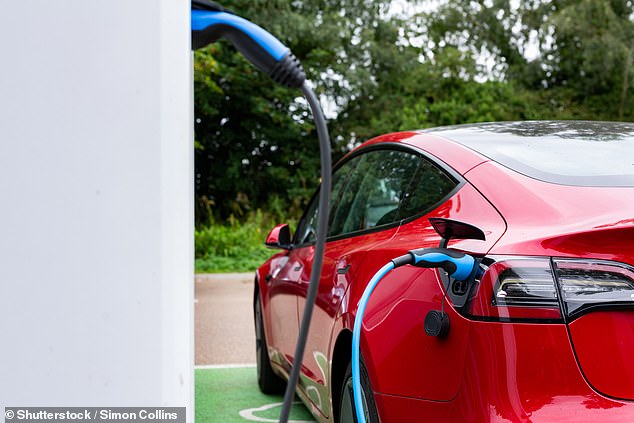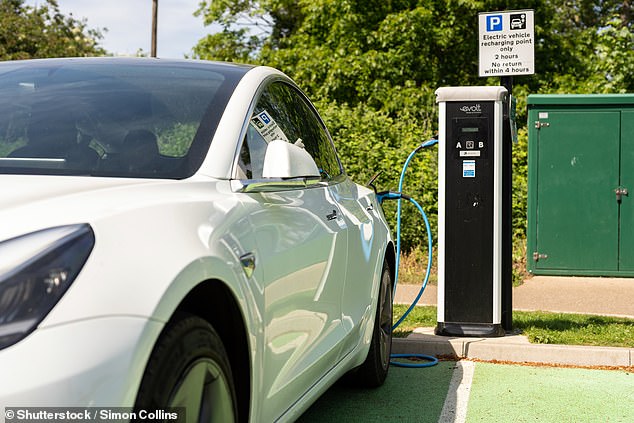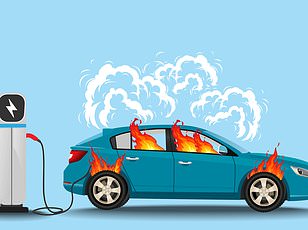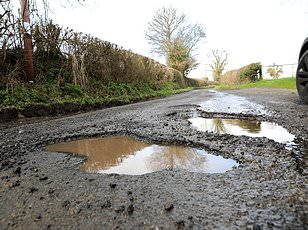Drivers of petrol and diesel cars have 'really poor' knowledge about EVs and it's stopping many from going green, think tank claims
- ECIU blames 'constant stream of EV misinformation' for lack of understanding
Most petrol and diesel car drivers have a 'really poor' level of knowledge about electric vehicles, and this is stopping them from switching to greener cars, a think tank claims.
In its recent poll, 57 per cent of 1,000 UK drivers of conventional internal combustion engine (ICE) cars answered no more than two out of 10 questions about EVs correctly.
The Energy and Climate Intelligence Unit, which commissioned the survey, blamed a 'constant stream of EV misinformation' for limiting drivers' knowledge about battery-powered cars.

An energy and climate think tank claims a 'constant stream of EV misinformation' has resulted in most petrol and diesel car owners having 'very poor' knowledge about battery models
Respondents were asked whether they thought 10 statements about EVs were true or false.
These covered topics such as ownership and running costs, the likelihood of them catching fire and the natural resources needed to both produce and run them.
But while the report claimed to find a high level of poor understanding in regards to EVs, it can be argued that some of the statements lack conclusive evidential information to support their accuracy, especially with the EV sector still in its relative infancy.
Others statements failed to acknowledge major issues relating to the same subject area.
For instance, drivers were asked to respond with a true or false answer to the statement that 'electric cars are more likely to catch fire than a petrol or diesel car'.
The answer to this, based on the findings from a number of studies, is false. Some state that EVs are 20 times less likely to catch fire than petrol and diesel cars.
But while research points to there being far fewer EV fires statistically compared to ICE, various studies make clear that they are far more difficult to control, put out and keep out - and therefore it can be argued that EVs pose a greater risk if they do set alight.
The ECIU report also claims that EV drivers currently do not pay more in insurance premiums compared to ICE cars. However, published industry records would suggest to disagree.
According to comparison site Confused.com, the average quoted EV premium in May 2024 was £910, compared with £790 for a hybrid car and £670 for a petrol or diesel car. Looking at the same month, rival comparison website GoCompare reported average quoted EV premiums to be £641, while the average across all other fuel types was £467.
Another statement asked drivers if the UK is 'not on course to install the charging infrastructure it will need to make the transition to EVs'.
While it said the correct response to this is 'false', the data to support this statement suggests there needs to be a significant jump in installations to meet targets.
According to Zap-Map, which provides government with EV public charging point stats, at the end of August there were 68,273 EV devices across the UK in total.
Last month saw an increase of 41 per cent year-on-year with 19,823 chargers added to the network over 12 months. In August alone, 1,494 new devices were installed.
The Government promised 300,000 devices by the end of the decade in order to meet demand for the rising number of EVs on the road.
If the UK is to meet the 300k target, it needs to add an average of 3,621 new public devices every month between now and the end of December 2029. This would mean increasing month installations by 142 per cent, suggesting the infrastructure is some way short of meeting the objective - though there is still enough scope for the rate of installations to accelerate.
In its conclusion of its survey, the think tank claims that 23 per cent of ICE drivers scored zero out of 10 in its quiz, while 90 per cent gave no more than five right answers, showing 'really poor' knowledge about EVs.

Official registration figures show 37,741 new EVs were registered by private buyers in the first seven months of the year. That represented a 9.5% reduction compared with the same period in 2023, despite the overall new car market increasing by 5.5%
Colin Walker, head of transport at the ECIU, said: 'All the myths being pedalled about EVs are misleading some petrol car drivers who now have a really poor knowledge of electric cars.
'For example they don't realise that a petrol car costs a lot more to own and run over its lifetime than an electric car.
'The constant stream of EV misinformation is clearly causing confusion, and holding many of the UK's drivers back from making the switch to cleaner and cheaper electric driving.
'The car industry is going to have to get serious about EV misinformation and the new Government will need to ask if it has a role to play too.'
Society of Motor Manufacturers and Traders (SMMT) figures show 37,741 new pure electric cars were registered for private buyers in the first seven months of the year.
That represented a 9.5 per cent reduction compared with the same period in 2023, despite the overall new car market increasing by 5.5 per cent.
The data also shows that fewer than one in five EV registrations are by private buyers, with fleets propping up the electric car market currently.
Among fleet registrations includes electric models registered to those using low-taxation salary sacrifice schemes, which prove that EVs can be popular if motorists can see a financial benefit over running an equivalent petrol or diesel car.
A report published by a House of Lords committee in February warned that the Conservative government's concern at the 'scale of misinformation' around EVs was not 'matched by commensurate urgency in tackling it'.
AA president Edmund King, a strong EV advocate, said: 'The switch to electric vehicles is a big jump for many, particularly when they don't know what they are getting into.
'We find drivers are hesitant rather than hostile, and much of this hesitancy is fuelled by misinformation.
'Once drivers get behind the wheel of an EV they rarely look back when they realise that EVs are better in terms of economy, environment and excitement.'
SMMT chief executive Mike Hawes said: 'While EV uptake continues to rise, the automotive industry continues to battle against the deluge of misinformation that is leading to many drivers missing out on their moment to go electric.
'Action must be taken to help buyers overcome upfront cost barriers, and perceptions over inadequate infrastructure can only be changed by ensuring plentiful, widespread supply, installed ahead of need.'














































